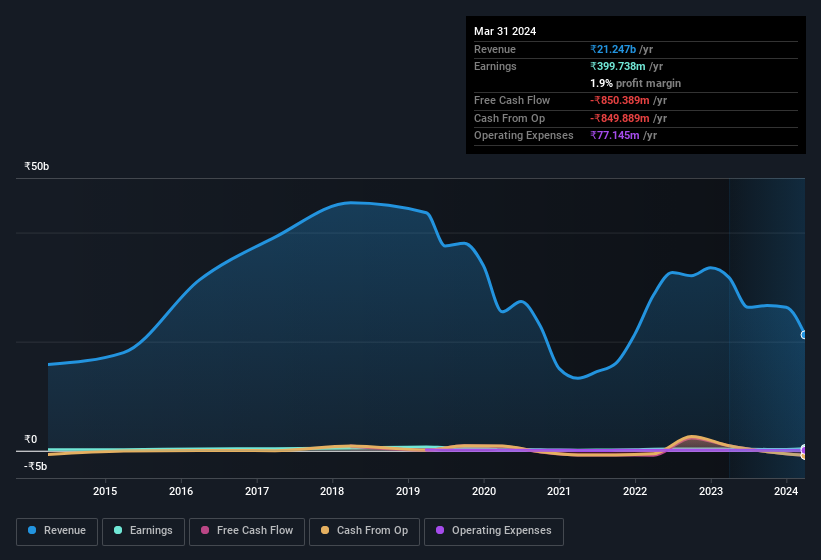- India
- /
- Food and Staples Retail
- /
- NSEI:SAKUMA
Sakuma Exports' (NSE:SAKUMA) Shareholders May Want To Dig Deeper Than Statutory Profit
The market for Sakuma Exports Limited's (NSE:SAKUMA) stock was strong after it released a healthy earnings report last week. While the profit numbers were good, our analysis has found some concerning factors that shareholders should be aware of.
See our latest analysis for Sakuma Exports

Examining Cashflow Against Sakuma Exports' Earnings
As finance nerds would already know, the accrual ratio from cashflow is a key measure for assessing how well a company's free cash flow (FCF) matches its profit. To get the accrual ratio we first subtract FCF from profit for a period, and then divide that number by the average operating assets for the period. This ratio tells us how much of a company's profit is not backed by free cashflow.
As a result, a negative accrual ratio is a positive for the company, and a positive accrual ratio is a negative. While having an accrual ratio above zero is of little concern, we do think it's worth noting when a company has a relatively high accrual ratio. Notably, there is some academic evidence that suggests that a high accrual ratio is a bad sign for near-term profits, generally speaking.
Sakuma Exports has an accrual ratio of 0.26 for the year to March 2024. Therefore, we know that it's free cashflow was significantly lower than its statutory profit, which is hardly a good thing. Even though it reported a profit of ₹399.7m, a look at free cash flow indicates it actually burnt through ₹850m in the last year. We saw that FCF was ₹908m a year ago though, so Sakuma Exports has at least been able to generate positive FCF in the past. The good news for shareholders is that Sakuma Exports' accrual ratio was much better last year, so this year's poor reading might simply be a case of a short term mismatch between profit and FCF. Shareholders should look for improved cashflow relative to profit in the current year, if that is indeed the case.
Note: we always recommend investors check balance sheet strength. Click here to be taken to our balance sheet analysis of Sakuma Exports.
Our Take On Sakuma Exports' Profit Performance
Sakuma Exports didn't convert much of its profit to free cash flow in the last year, which some investors may consider rather suboptimal. Because of this, we think that it may be that Sakuma Exports' statutory profits are better than its underlying earnings power. But on the bright side, its earnings per share have grown at an extremely impressive rate over the last three years. Of course, we've only just scratched the surface when it comes to analysing its earnings; one could also consider margins, forecast growth, and return on investment, among other factors. If you want to do dive deeper into Sakuma Exports, you'd also look into what risks it is currently facing. Case in point: We've spotted 4 warning signs for Sakuma Exports you should be mindful of and 3 of these don't sit too well with us.
This note has only looked at a single factor that sheds light on the nature of Sakuma Exports' profit. But there is always more to discover if you are capable of focussing your mind on minutiae. For example, many people consider a high return on equity as an indication of favorable business economics, while others like to 'follow the money' and search out stocks that insiders are buying. While it might take a little research on your behalf, you may find this free collection of companies boasting high return on equity, or this list of stocks with significant insider holdings to be useful.
New: Manage All Your Stock Portfolios in One Place
We've created the ultimate portfolio companion for stock investors, and it's free.
• Connect an unlimited number of Portfolios and see your total in one currency
• Be alerted to new Warning Signs or Risks via email or mobile
• Track the Fair Value of your stocks
Have feedback on this article? Concerned about the content? Get in touch with us directly. Alternatively, email editorial-team (at) simplywallst.com.
This article by Simply Wall St is general in nature. We provide commentary based on historical data and analyst forecasts only using an unbiased methodology and our articles are not intended to be financial advice. It does not constitute a recommendation to buy or sell any stock, and does not take account of your objectives, or your financial situation. We aim to bring you long-term focused analysis driven by fundamental data. Note that our analysis may not factor in the latest price-sensitive company announcements or qualitative material. Simply Wall St has no position in any stocks mentioned.
About NSEI:SAKUMA
Mediocre balance sheet with questionable track record.
Similar Companies
Market Insights
Community Narratives



